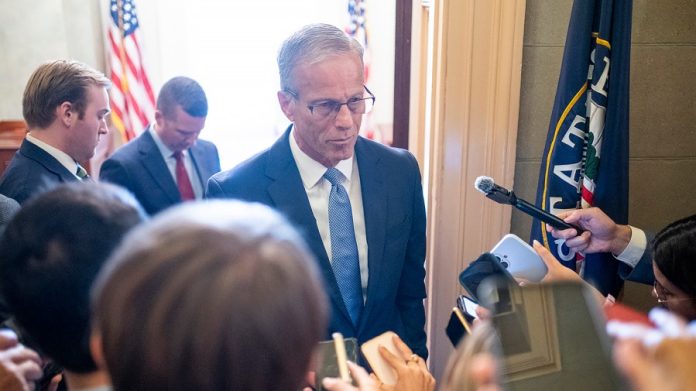
Senate Republicans on Monday formally got the ball rolling on their bid to invoke the so-called nuclear option and change the chamber’s rules in order to expeditiously confirm dozens of President Trump’s stalled nominees in the coming weeks.
Senate Majority Leader John Thune (R-S.D.) on Monday started the process of making the rules change on the floor by filing a resolution that includes dozens of nominees awaiting confirmation.
The initial procedural vote on the resolution is expected to take place on Thursday, with the rule change expected to be finalized early next week, followed quickly by a vote on the first batch of nominees themselves.
“We’ve got a crisis, and it’s time to take steps to restore Senate precedent and codify in the Senate rules what was once understood to be standard practice,” Thune said on the floor on Monday. “Eight months of petty partisanship is long enough.”
The plan Thune teed up is based on a Democratic proposal made by Sen. Amy Klobuchar (D-Minn.) two years ago, which called for allowing 10 nominees from the same committee to be confirmed “en bloc.”
The GOP blueprint goes further, however, as it would allow Republicans to pass an unlimited number of nominees in a single tranche, including scores of sub-Cabinet selections and picks to serve as U.S. attorneys.
While Senate Republicans have loudly beat the drum citing those with bipartisan support, the rule will also extend to those who have advanced from committee with partisan backing.
The rules change would not apply to judicial nominees, who would still be subject to the requisite two hours of floor consideration.
Cabinet and Supreme Court nominees will still require 30 hours of consideration and are not eligible to be greenlighted in a bloc.
Sens. James Lankford (R-Okla.) and Katie Britt (R-Ala.) headed up a working group during the August break to discuss and work through potential changes. Part of the calculus for that cadre of lawmakers was coming up with an idea that they would not regret when they are eventually in the minority and Democrats are able to wield the “en bloc” power.
“Quite frankly, the resolution is: Would this work for Democrats or Republicans regardless of who [is in the majority]? Yes, because this is the way it was typically done in the past,” Lankford told reporters. “We’ve got to get back to that.”
For much of the past two months, Republicans have cried foul that none of Trump’s nominees, especially those who are considered noncontroversial, have been able to clear the chamber via unanimous consent or voice vote. Secretary of State Marco Rubio is the lone nominee who was not subjected to a filibuster this year.
By contrast, 57 percent of former President Biden’s choices were confirmed via voice vote or unanimous consent, with that number being 65 percent during Trump’s first term. Roughly 90 percent of confirmations made by former Presidents George W. Bush and Obama were done through those two avenues.
“Republicans aren’t going to tolerate this obstruction any longer,” Thune said in an op-ed earlier on Monday. “We have tried to work with Democrats in good faith to batch bipartisan, noncontroversial nominees and clear them expeditiously, according to past precedent. Democrats have stood in the way at every turn.”
Monday’s move comes more than a month after Senate Minority Leader Chuck Schumer (D-N.Y.) and top Republicans were unable to strike a deal on a nominations package in the final hours before the August recess.
Trump panned Schumer for wanting too much in return in talks. The New York Democrat declared victory in the battle, having argued that Trump’s nominees deserve increased scrutiny — a claim he reiterated on Monday while railing against a judicial nominee the chamber was voting on later in the evening.
“Now, rather than giving those [pre-August] talks another chance, Republicans would rather change how the Senate operates to weaken this chamber’s traditional and powerful sense of deliberation,” Schumer said. “If Republicans go nuclear, the historically bad nominees we’ve seen so far under Donald Trump will only get worse.”
“Think carefully before taking this step,” he added. “If you go nuclear, it’s going to be a decision you will come to regret.”

